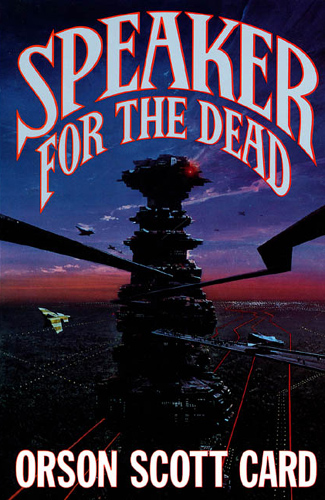So I'm going to do some book reviews now. Not so much because I feel any particular need to make known my opinions, but because my memory, as far as memories go, isn't super, and in 8-12 months I know I'm going to need some sort of written aid to help me remember not only what happened, but also who did what, and what I liked about them. So yeah.
Speaker for the Dead:
I liked this book more than I thought I would. Loved it actually, and that was really surprising, because when I read Ender's Game about four years ago, my principle reaction was, Eh, kinda slow. The twist at the end blew me away, but struggling through 200 pages of cryptic dream sequence and battle school strategerie wasn't exactly my definition of "worth it."
Speaker for the Dead wasn't that. The stakes were monstrous right from the word "go," the characters were varied and relatable, and the world building felt so natural in its uniqueness that I never once felt the need to question it, even though, half the time, they spoke about it in Portuguese.
This book came out almost 30 years ago, so I'm a little late to the party, but I now get why Card is perhaps the biggest name in Science Fiction, ever. Ender's Game was Card's first exploration into Ender's world, and in several respects this was apparent. In Speaker, Card has perfected and mastered his world, and it makes this novel an exciting and thought-provoking read from beginning to end.
My beef with many works of SciFi is that the stories trend toward the unrelatable. The authors get so excited about their SciFi universe that the character development takes a back seat to the world development, and that rarely flies with me (pun intended), even in short stories, but especially in novels.
Not so in Speaker. The world feels so natural, so quickly, that both author and reader are free to focus on the tortured Novinha, the stoic Miro, and the singular Ender from the very beginning. It's the perfect storm of characters who fit naturally into their environment, even as the seek to change it.
My one criticism is small, but notable. For a work filled with deeply flawed, imperfect characters, Ender is surprisingly flawless. He's a genius, he's compassionate, he's perhaps the most perceptive and empathetic human being ever, and he's relentlessly driven to correct a wrong for which he, arguably, isn't to blame. He's pseudonymously published his own space-age humanist Gospel, inadvertently founded his own religion, he hates no one, understands everyone, and still has the time to become functionally proficient in Portuguese in under three weeks. All his B.M.'s are single wipers, he's pitch-perfect as both a Tener 1 and a Bass 2, and he's the most generous lover from here to Trondheim. Some guys just got it all.
And yet, despite his seeming perfection, Ender still manages to convince me of the difficulty of all his decisions, as though his 3000 year unbeaten streak were on the line with every one, and that's what makes him a true champion: he's got the goods, and he knows how to use them, just like this book.
5/5
Thomas out.

No comments:
Post a Comment